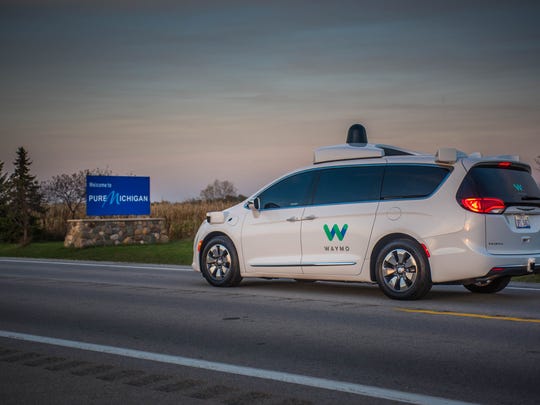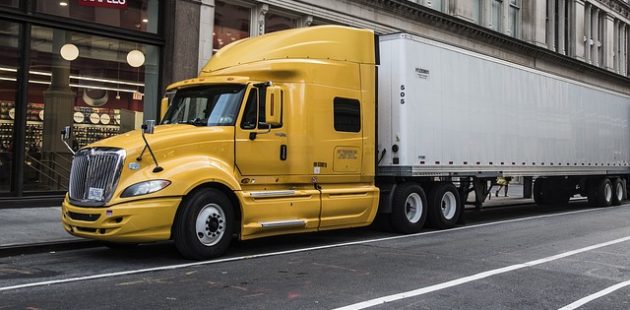Waymo Plans Final Assembly On Self-Driving Cars in Detroit
via Detroit Free Press, April 23, 2019
Waymo has picked Detroit for final assembly of its self-driving vehicles.
The company, once known as Google’s self-driving car project and now a leader in the push to develop autonomous vehicles, had previously said it was scouting locations in southeast Michigan but did not name a specific city.
CEO John Krafcik revealed Detroit as the company’s choice in a blog post scheduled to publish Tuesday titled, “Making Waymos in Motor City.” It refers to being “up and running” this year.
“Today, we’re excited to announce that we’ve found the perfect facility in Detroit. We will partner with American Axle & Manufacturing to repurpose an existing facility, bringing a workforce back to an area where jobs in the automotive industry were recently lost,” according to the post.
A company spokeswoman said the Detroit facility will be where the company integrates Waymo’s self-driving hardware and software systems into Chrysler Pacificas and Jaguar I-Paces for its commercial ride-hailing fleet.
A Michigan Economic Development Corp. memo had said the project would involve the creation of at least 100 jobs with a potential for 400 jobs and a capital investment of $13.6 million. Waymo, which is a subsidiary of Alphabet Inc., Google’s parent, had requested an $8 million Michigan Business Development Program grant.
Waymo is to lease and repurpose an existing facility on the American Axle and Manufacturing campus on Holbrooke where American Axle has its world headquarters, Detroit Business office and Advanced Technology Development Center. The company notes that it ended production of front axles there in 2012.

The location was most recently being used as sequencing center for a local parts supplier, and American Axle recently moved back into the facility with business operations in the administrative portion of the building, according to the company.
Chris Son, American Axle vice president of marketing and communications, said in a statement that “we are excited to partner with Waymo and be a part of bringing future automotive technology to our Detroit campus.”
There had been some speculation that General Motors’ Detroit-Hamtramck Assembly plant, which is scheduled to be idled in 2020, could be in play, although that offered considerably more space than the 200,000 square feet Waymo was seeking. In addition, GM’s Cruise unit is in competition with Waymo on self-driving vehicle development.
Waymo has billed its project as the “world’s first factory 100%-dedicated to the mass production of L4 autonomous vehicles.” The National Highway Traffic Safety Administration, citing the Society of Automotive Engineers, lists Level 4 as high automation, one step below full automation.
“The vehicle is capable of performing all driving functions under certain conditions. The driver may have the option to control the vehicle,” according to the definition of Level 4.
GM has produced “near Level 4” Chevy Bolts for test purposes at its Orion Assembly Plant.
‘Center of the auto industry’
Krafcik thanked a range of individuals and entities for their assistance in the location effort, including Mayor Mike Duggan, Gov. Gretchen Whitmer, former Gov. Rick Snyder, American Axle and even Dan Gilbert’s Bedrock development company.
Both Duggan and Whitmer were quoted in Krafcik’s piece. Duggan said the “announcement by Waymo shows that the city of Detroit remains at the center of the future of the auto industry” and Whitmer noted that “Waymo is continuing the city’s momentum and further cementing Michigan as a leader in mobility and the epicenter of advanced automotive manufacturing.”
Krafcik cited metro Detroit’s automotive industry strengths as a key reason for focusing on the area.
“We wanted this facility to benefit from a location in southeast Michigan — the heart of the American automotive industry — and its strong talent base. We began looking for a facility that would allow us to quickly get up and running by mid-2019 while offering us the flexibility to continue to grow and expand our operations in Michigan over time and where there was a strong pool of talent across engineering, operations and fleet coordination,” Krafcik wrote.
He noted that “we’re thrilled to join Detroit’s vibrant community, helping to play a role in the future of the automotive industry in the city that started it all.”
The factory will add to Waymo’s presence and connections in southeast Michigan and nearby Ontario. Waymo has about 20 employees in the Novi area and a partnership with Fiat Chrysler Automobiles, which supplies Windsor-made Chrysler Pacifica minivans.
FCA plans
The news is the second announcement this year related to auto manufacturing in Detroit.
Fiat Chrysler in February announced a $4.5 billion expansion in Wayne and Macomb counties, expected to result in 5,000 jobs.
The plan includes a new Jeep plant at the company’s idled Mack Avenue Engine factory and an expansion of the Jefferson North Assembly Plant. That deal is pending the City of Detroit assembling 200 acres to complete FCA’s needed footprint. The 60-day deadline to complete that under the city’s agreement with FCA is this week.
Earlier this month, the city said it was still negotiating the last piece of property needed with the Moroun family. Through its Crown Enterprise real estate arm, the family owns the 80-acre former Budd plant site near Charlevoix and Conner on the east side. Crown currently leases that site to Chrysler for use as a parking lot for new vehicles produced at its Jefferson North Assembly Plant.
Find the original article here.
Find additional PTIO media updates here.


